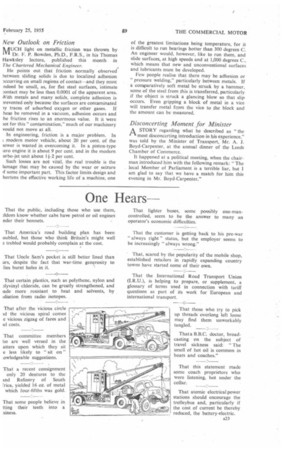One Hears
Page 25

If you've noticed an error in this article please click here to report it so we can fix it.
That the public, including those who use them, Adorn know whether cabs have petrol or oil engines nder their bonnets.
That America's road building plan has been oubled, but those who think Britain's might well e trebled would probably complain at the cost.
That Uncle Sam's pocket is still better lined than ars, despite the fact that war-time generosity to lies burnt holes in it.
That certain plastics, such as polythene, nylon and Dlyvinyl chloride, can be greatly strengthened, and lade more resistant to heat and solvents, by Ldiation from radio isotopes.
That after the Vicious circle Id the vicious spiral comes e vicious zigzag of fares and el costs.
That committee members ho are well versed in the atters upon which they sit e less likely to "sit on" owledgeable suggestions.
That a recent consignment only 20 dentures to the ind Refinery of South 'rica, yielded 16 oz. of metal which four-fifths was gold.
That some people believe in tting their teeth into a siness.
That lighter buses, some possibly one-mancontrolled, seem to be the answer to many an operator's economic difficulties.
That the customer is getting back to his pre-war "always right" status, but the employer seems to be increasingly "always wrong."
' That, scared by the popularity of the mobile shop, established retailers in rapidly expanding country towns have started some of their own.
That the International Road Transport Union (I.R.U.), is helping to prepare, or supplement, a glossary of terms used in connection with tariff questions as part of its work for European and international transport.
That those who try to pick up threads overlong left loose may find them unworkably tangled.
That a B.B.C. doctor, broadcasting on the subject of travel sickness said: "The smell of hot oil is common in boats and coaches."
That this statement made some coach proprietors who were listening, hot under the collar.
That atomic electrical power stations should encourage the trolleybus and, particularly if the cost of current be thereby reduced, the battery-electric.




















































































